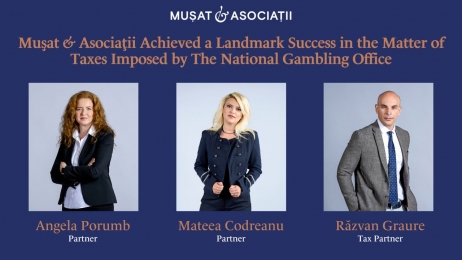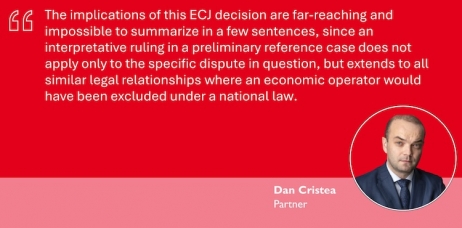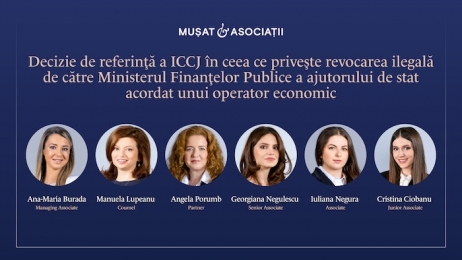
The 2019 Edition of the Survey The PwC Romania Trends on Tax Inspections of 2019 highlighted among others that 45% of the participating companies challenged the tax acts, compared to 38% of the contestation highlighted by the similar survey conducted in 2018 and almost one third (28%) of the tax appeals were resolved favorably or partially favorably, compared with 57% of the favorable administrative solution highlighted by the similar survey conducted in 2018.
Almost a quarter (22%) of the surveyed companies said they were subject to tax inspections in 2018. According to data released by the National Agency for Tax Administration (ANAF), the number of tax inspections carried out in the first nine months of 2018 was almost at the same level as in the same period in 2017. The inspections carried out by the tax anti-fraud unit were 45% more than in the same period last year. From this perspective, it should be noted that participants in the PwC 2019 survey mentioned an increase in the number of tax audits carried out in 2018 (22% of total participants) compared to 2017 (8% of total). In contrast, out of the sample of 139 companies surveyed in the PwC survey, 18% were never subject to tax inspections, while 24% were controlled before 2013.
As with the PwC 2018 survey, most of the inspections (40%) had a relatively short duration (1-3 months), and the additional payment amounts in most cases (43%) were up in 500,000 lei. In 18% of cases, inspections lasted more than a year and there were cases where the additional amounts set exceeded 2 million. One important point to note is that in 18% of cases no additional payment amounts have been established following tax audits.
Like the previous edition of the PwC survey on tax inspections, most of the participating companies said the attention of tax inspection teams was also focused on corporate tax and value added tax (VAT). 45% of the controls had the main focus on corporate income tax, namely the deductibility of services, adjustments from controlling transfer pricing, fuel expenditure deductibility, the deduction of the technology consumption standard or qualitatively degraded goods. More than one third (36%) indicated value added tax (VAT) as the main focus of tax inspectors, from the deduction of value added tax for different goods and services to items that applied for the reductions under different promotions.
"The existence of a computer system linking the taxpayer and the tax authorities would substantially improve both the level of collection of fees and the traceability of documents and due debts. A system of simple and clear procedures and forms to keep from one financial exercise to another would greatly contribute to taxpayers' compliance, as well as the ease in submitting them on time, fairly and completely. Predictability and legislative stability are two important conditions that can ensure confidence in the Romanian tax system as well as sustainable long-term development of companies, "said Daniel Anghel, Leader of Tax and Legal Consultancy, PwC Romania.
In cases where taxing actions were challenged by companies, according to the PwC Survey, it was found that in 23% of the cases, a total or partial cancellation was made. In 5% of cases, the re-examination of the disputed aspects was entirely ordered. These taxpayer-friendly solutions (28%), although a lower percentage than the results of the survey last year (57%), show an even stronger tendency for the review bodies to confirm the interpreters' interpretations. Just like last year, about half of the survey participants (49%) used assistance from external consultants during or after tax inspections, and those who have fully recovered the tax situation following the tax appeal were assisted by 100% external consultants.
Of those who have received a negative or partially favorable solution to the challenge of taxing, a majority of 56% chose to appeal the lawsuits. Of the cases in which the court proceeded, in approximately 15% of the cases the court canceled the tax acts. In the other cases (85%), the file is still pending at the courts, the litigation being still at an early stage.
"The fairly high percentage of companies choosing to challenge taxpayers shows taxpayers' confidence in the arguments put forward in the administrative phase, which they want to bring to the attention of the courts, for the protection of their rights violated by the solutions adopted by the tax authorities. Different interpretations of the legislation in force are often the result of a difficult and difficult legislative framework that has been adopted too lately, in violation of decision-making transparency. Better communication and a constructive discussion of legislation would contribute to predictability and voluntary compliance, and ultimately relieve trials that could be avoided, "said Dan Dascălu, Partner, Leader of the Commercial and Tax Litigation Team, D&B David and Baias.



 March 07, 2019 11:10
March 07, 2019 11:10 










